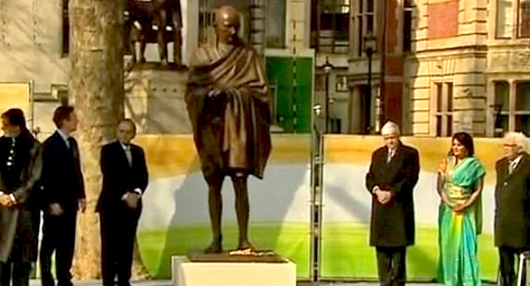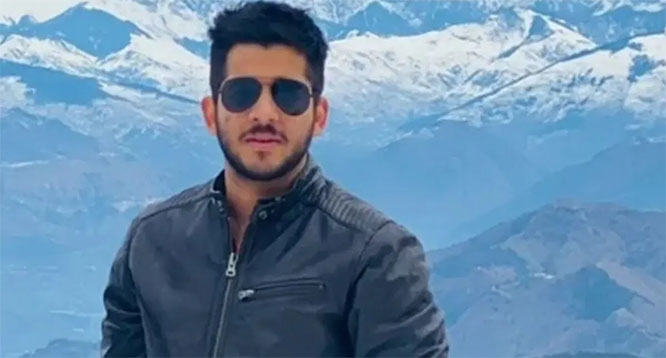London, Mar 14: A historic bronze statue of Mahatma Gandhi was unveiled today at the Parliament Square here, standing adjacent to iconic leaders like Britain's war-time Prime Minister Winston Churchill and anti-apartheid icon Nelson Mandela.
A galaxy of political leaders led by British Prime Minister David Cameron and Finance Minister Arun Jaitley were joined by Bollywood legend Amitabh Bachchan and the Mahatma Gandhi's grandson Gopalkrishna Gandhi at the ceremony to unveil the 9-foot statue of India's Father of the Nation.

Gandhi is the first Indian and the only person never to have been in a public office to be honoured with a statue at the Square.
The statue was unveiled jointly by Cameron and Jaitley as chants of "Raghupati Raghav Raja Ram", a popular bhajan that was Gandhi's favourite, reverberated in the air.
"This statue is a magnificent tribute to one of the most towering figures in the history of world politics and by putting Mahatma Gandhi in this famous Square we are giving him an eternal home in our country," said Cameron.
Quoting some of Gandhi's famous words, Cameron highlighted how his teachings remain as potent today.
"This statue celebrates the incredibly special friendship between the world's oldest democracy and its largest, as well as the universal power of Gandhi's message," Cameron said.
"Our ties with India have remained close throughout history and continue to go from strength to strength –- through mutual respect as equals, cooperation and trade, and of course through the one-and-a-half million Indians who do so much to make Britain the country it is today, bringing our two countries closer, to the benefit of both," he said.
Jaitley, invited to the UK especially for the unveiling, said the statue was a tribute to the British sense of civility that they now choose to honour someone who was conventionally regarded as their adversary.
"It is a great tribute to both British liberalism and British democracy that they have now chosen Gandhi to share what is the most prominent public space in this country. It is a great day when two adversaries and contrarian viewpoints converge to appreciate each other," Jaitley said.
"The statue will help ensure that the legacy of Gandhi lives on for future generations. It also marks an important, historic moment celebrating the strong bond between our two nations. India and the UK share the same values and we are a partnership of equals. This lasting friendship is just one of many legacies left by Gandhi, which I am keen that we work hard to strengthen further," he said.
His words were echoed by UK Treasury minister and Indian Diaspora Champion Priti Patel, who said: "Gandhiji was a man who became a great agitator of the British government back then. We have now got him coming to Parliament Square in front of the mother of all Parliaments. It is incredibly symbolic."
The sculptor, Philip Jackson, described his creation as an important symbol in the global fight against terror.
"We live in an age where terrorism and acts of random violence are used in an attempt to effect change. Gandhi's sculpture reminds us all that great change can be achieved peacefully and without violence," said the well-known British figurative artist.
Mahatma Gandhi's statue now stands exactly opposite Britain's Houses of Parliament in the Palace of Westminster with Churchill for company, an irony given the British ex-premier's dismissive thoughts of someone he described as a "half naked fakir".
It depicts the leader of the Indian national movement wrapped up in a shawl to shield himself from the London cold during his last visit to the British capital in 1931.
NRI economist and founder of the Gandhi Statue Memorial Trust, Lord Meghnad Desai, described the unveiling as "great occasion for India, UK and the world."
"Gandhi belongs to the whole world but has now found a home in the centre of London, a city which he loved. Let everyone come from everywhere and see for themselves Gandhi in Parliament Square in London," he told PTI.
Lady Kishwar Desai, a Trustee behind the 1-million pound global fund-raising efforts for the statue, said, "To have a permanent memory of Mahatma Gandhi in front of the British Parliament is something every Indian and British-Asian would have wished for."
The move to install Gandhi's statue was announced during an official UK ministerial visit last year and donors have included leading Indian-origin businessmen like steel tycoon Lakshmi N Mittal, Infosys co-founder Narayana Murthy and his family and Bajaj Auto chief Rahul Bajaj.
The sculpture is aimed as a focal point for commemoration of the 100th anniversary of Gandhi's return to India from South Africa to start India's struggle for freedom, as well as the passing of 70 years since his death in 2018, and the 150th anniversary of his birth in 2019.







Comments
Add new comment